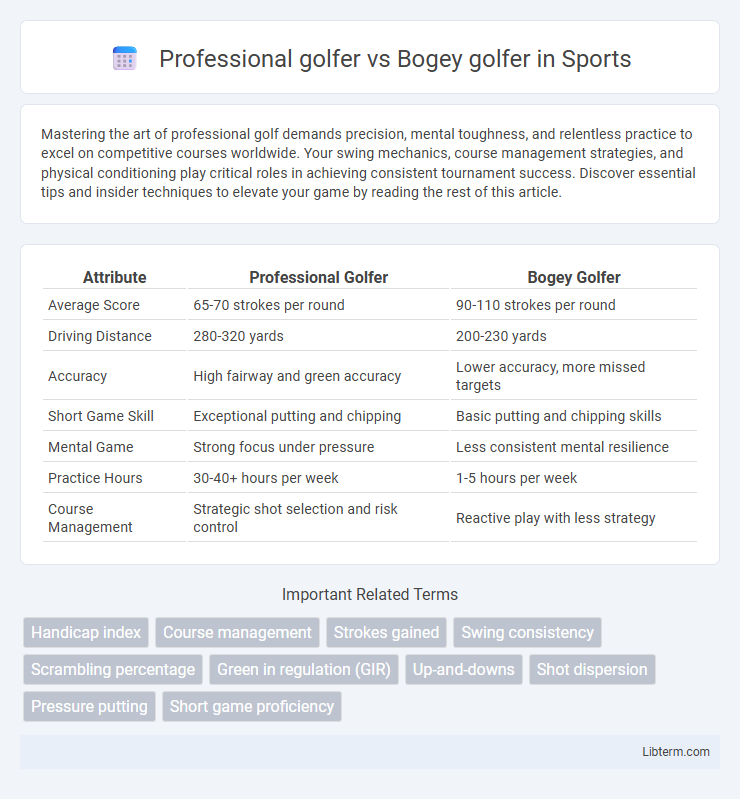Mastering the art of professional golf demands precision, mental toughness, and relentless practice to excel on competitive courses worldwide. Your swing mechanics, course management strategies, and physical conditioning play critical roles in achieving consistent tournament success. Discover essential tips and insider techniques to elevate your game by reading the rest of this article.
Table of Comparison
| Attribute | Professional Golfer | Bogey Golfer |
|---|---|---|
| Average Score | 65-70 strokes per round | 90-110 strokes per round |
| Driving Distance | 280-320 yards | 200-230 yards |
| Accuracy | High fairway and green accuracy | Lower accuracy, more missed targets |
| Short Game Skill | Exceptional putting and chipping | Basic putting and chipping skills |
| Mental Game | Strong focus under pressure | Less consistent mental resilience |
| Practice Hours | 30-40+ hours per week | 1-5 hours per week |
| Course Management | Strategic shot selection and risk control | Reactive play with less strategy |
Introduction: Understanding Professional and Bogey Golfers
Professional golfers exhibit exceptional skills, consistent swing mechanics, and strategic course management, regularly achieving pars or better scores. Bogey golfers typically score one stroke over par on average, showing moderate proficiency with less precision and consistency. The gap in performance reflects differences in training, experience, and mental approach on the course.
Defining a Professional Golfer
A professional golfer competes in tournaments for prize money and maintains a high skill level with a consistent swing, precise shot-making, and strategic course management. They typically rank among the top players globally, often holding PGA or LPGA Tour cards, and have extensive experience in competitive play. In contrast, a bogey golfer generally scores around one stroke over par per hole, representing an amateur with moderate proficiency and less consistency on the course.
Who is a Bogey Golfer?
A bogey golfer typically scores one stroke over par on each hole, averaging around 90-100 strokes per 18-hole round. Unlike professional golfers who regularly shoot under par or near par scores, bogey golfers play with less precision and consistency, often struggling with accuracy and course management. This level represents an amateur player with moderate skills, frequently making bogeys rather than pars or birdies.
Skill Levels: Pro vs. Bogey Golfer
Professional golfers demonstrate precision in shot-making, consistently achieving low scores through refined swing mechanics, course management, and mental toughness. Bogey golfers typically have higher handicaps, struggling with accuracy and consistency, often averaging one stroke over par on each hole. The skill gap is evident in driving distance, approach shots, and putting efficiency, with pros executing under pressure and bogey golfers frequently facing challenges in maintaining control and strategy.
Course Management Differences
Professional golfers excel in course management by meticulously analyzing yardages, selecting precise club types, and adapting strategies based on weather and course conditions. Bogey golfers often lack this strategic planning, frequently making risky shots without accounting for hazards or optimal shot placement. The professionals prioritize consistency and risk minimization, while bogey golfers tend to rely more on raw power and less calculated decisions.
Equipment Choices and Technology
Professional golfers rely on custom-fitted clubs and advanced materials such as carbon fiber and titanium to optimize performance, while bogey golfers typically use off-the-shelf clubs designed for forgiveness and ease of use. Professionals benefit from precision-engineered golf balls with specific compression ratings tailored to their swing speed, whereas bogey golfers often choose multi-layer balls that maximize distance and spin control for inconsistent swings. Technology like adjustable drivers and launch monitors helps professionals fine-tune their equipment, a resource less accessible or necessary for bogey golfers focusing on improving consistency.
Training and Practice Routines
Professional golfers dedicate extensive hours daily to training, emphasizing technical precision, physical fitness, and mental conditioning to enhance performance under tournament pressure. Their practice routines involve structured drills focusing on swing mechanics, short game accuracy, and course management strategies, often guided by coaches and advanced technology like launch monitors. In contrast, bogey golfers typically engage in less frequent and less systematic practice, concentrating on general play and enjoyment rather than targeted skill refinement or physical conditioning.
Mental Approach and Game Strategy
Professional golfers exhibit a disciplined mental approach, maintaining unwavering focus and resilience under pressure, which allows them to execute strategic, risk-adjusted shots with precision. Bogey golfers often struggle with course management and emotional control, leading to inconsistent decision-making and errors that increase their scores. Effective game strategy for professionals involves analyzing pin positions, wind conditions, and fairway layouts to optimize shot selection, whereas bogey golfers tend to lack this analytical consistency.
Scoring Patterns and Performance
Professional golfers consistently achieve lower scores, often under par, due to superior shot accuracy, course management, and mental resilience, resulting in frequent birdies and eagles. Bogey golfers typically score above par, struggling with precision and course strategy, which leads to more bogeys and double bogeys. The stark contrast in scoring patterns highlights the professionals' ability to minimize strokes and maintain steady performance under pressure.
Pathways to Improvement for Bogey Golfers
Bogey golfers can accelerate their improvement by focusing on consistent swing mechanics, targeted short game practice, and course management strategies. Utilizing technology such as launch monitors and video analysis helps identify specific weaknesses, enabling personalized training plans. Regular lessons with a PGA professional provide expert feedback and structured progression, transforming bogey golfers into more skilled players.
Professional golfer Infographic

 libterm.com
libterm.com